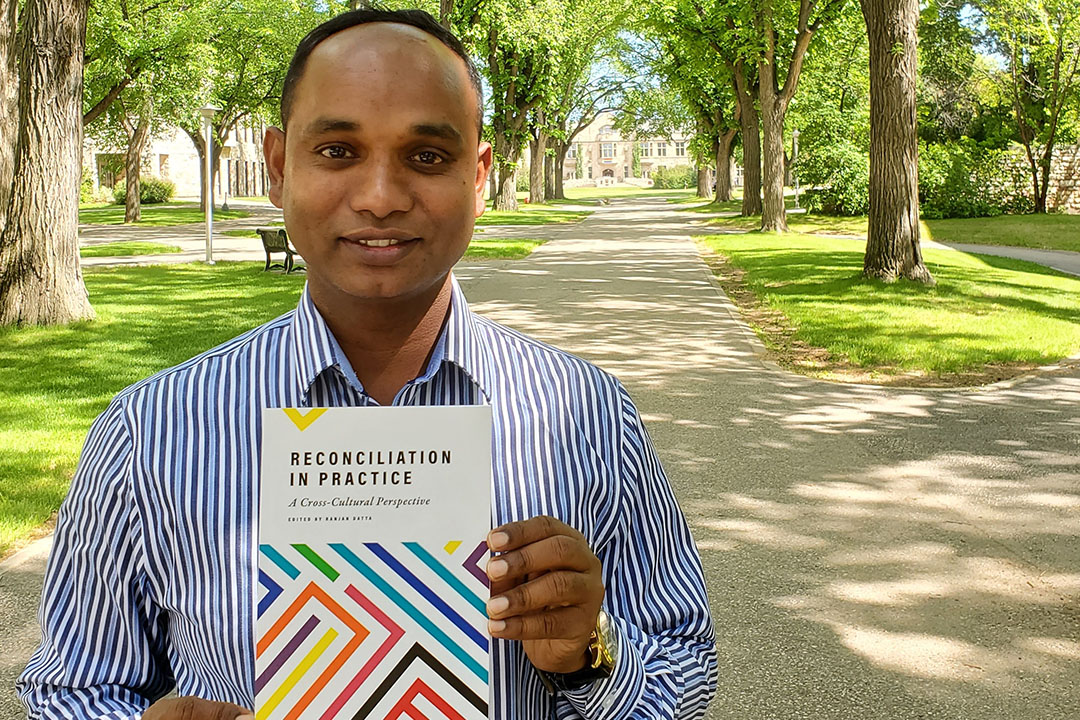
Dr. Ranjan Datta: The road to reconciliation
Dr. Ranjan Datta (PhD) believes everyone has a role to play in contributing to the ongoing reconciliation process in Canada.
By Megan EvansThe University of Saskatchewan (USask) alumnus was born in Bangladesh and witnessed racism firsthand as his family suffered persecution because of their Indigenous and minority identity. Being on the receiving end of racism in his home country, he decided to emigrate to Canada where Indigenous mentorship has helped him and his family enjoy a healthy and vibrant life.
Datta, a graduate of USask’s School of Environment and Sustainability (SENS), was interested in ways he could engage as a scholar with the recommendations from the Truth and Reconciliation Commission’s 94 calls to action, which were released in 2015.
“It was only at the University of Saskatchewan that I had an opportunity to learn about Indigenous colonial history and Indigenous contributions. As an immigrant, I benefit from the colonial systems set up by Canadian settlers, even if I am a person of colour. I need to take responsibility to change these systems through my anti-racist and decolonial education and practice,” he said.
His book, Reconciliation in Practice: A Cross-Cultural Perspective, is a compilation of essays, personal reflection and poetry written by immigrants, refugees and others. This compilation explores themes like building respectful relationships with Indigenous Peoples, respecting Indigenous treaties, learning the roles of colonized education processes, and creating intercultural spaces for social interactions.
His book also suggests that both Indigenous and non-Indigenous people need to do more than just talk about reconciliation: Each individual must learn how to take responsibility for reconciliation in everyday life—within ourselves and our families, in our communities, in our education, and our workplaces.
“I wanted to create this book as a compilation of different experiences, because no one person has the answers we need to move forward and everyone must contribute to reconciliation in their own way. Reconciliation is about meaningful collaboration, not a final destination. And it is something of practice or an on-going process,” Datta explained. “Being anti-racist is something I commit to everyday. Ending racism is not about ending discrimination against any one group—it is about ending race-based discrimination for every person. Justice for Indigenous people means justice for me. Everyone must participate if we are to succeed in eliminating racism.”
“As a researcher, I must take care to ensure that I do not perpetuate colonial or racist approaches to problem solving, by dictating what someone else needs to do based on my own experience and assumptions.”
When Datta approaches a research problem, he tries to understand it holistically. For instance, when looking at an issue of land-water management, Datta looks not only at the effects of pollution on the natural environment, but also the spiritual, mental, and physical health implications for community members.
“When I am doing research on an environmental issue within a community, I put that community at the centre. Their experience with the problem, their knowledge of the subject, and their needs in the solution cannot be left out or the solution will not be ultimately sustainable,” he said. “I have found that the community leaders are always willing to share what they know, and that they also want to learn from me. The combination of their historical and traditional knowledge and my expertise generates more comprehensive answers to any question we tackle together. The community shapes me as a researcher.”
Dr. Datta’s book, Reconciliation in Practice: A Cross-Cultural Perspective, is now available. Datta is a Banting Postdoctoral Fellow in the Johnson Shoyama Graduate School of Public Policy at the University of Regina. He completed his PhD from the School of Environment and Sustainability at the University of Saskatchewan in 2016.
Article re-posted on .
View original article.

